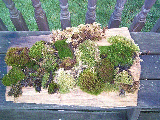 As you have probably already guessed, this is a photo of a moss collection. There is an article in the most recent Conservation in Practice about moss cultivation that caught my attention. Wait … read on:
As you have probably already guessed, this is a photo of a moss collection. There is an article in the most recent Conservation in Practice about moss cultivation that caught my attention. Wait … read on:
Indeed, so widespread is the commercial use of wild-collected mosses that some U.S. forests are undergoing the botanical equivalent of strip mining. According to results from a study released in 2004, the U.S. floral industry alone consumes up to 37 million dry kilograms of moss each year–for both domestic purposes and export. Patricia Muir, the study’s author and a professor of botany and plant pathology at Oregon State University in Corvallis, calculates that this amount is enough to fill some 2,400 semi trucks, most of it coming from the Pacific Northwest and the Appalachian Mountains. Although she cautions that these figures are ball-park estimates–few accurate records on permitted moss collecting are kept, and illegal harvesting is rampant–Muir speculates that the commercial value of mosses can add up to US$165 million annually.
The idea is to make cultivating moss more cost effective than simply collecting it from the wild, thus eliminating one more assault on healthy ecosystems. People would just quit collecting moss because it would not be worth it. Hey, it worked for the New Caledonian crested gecko. Use the free market to force the issue instead of laws, incarceration, and fines. Either way, the people who make a living tramping through the woods collecting geckos or moss have to find another livelihood.
Would the world miss this moss if the source dried up? Personally, I think we would find a way to survive. In this case, making it illegal to collect in the wild might accelerate cultivation techniques, spurring an industry to replace it with something else. Either way, it would create economic growth in one form or another replacing one livelihood with, hopefully, a less environmentally destructive one.
My youngest daughter wrote a two-page book on this very subject. It is posted on the net, awaiting peer review if anyone is interested, duh!
 As you have probably already guessed, this is a photo of a moss collection. There is an article in the most recent Conservation in Practice about
As you have probably already guessed, this is a photo of a moss collection. There is an article in the most recent Conservation in Practice about 
